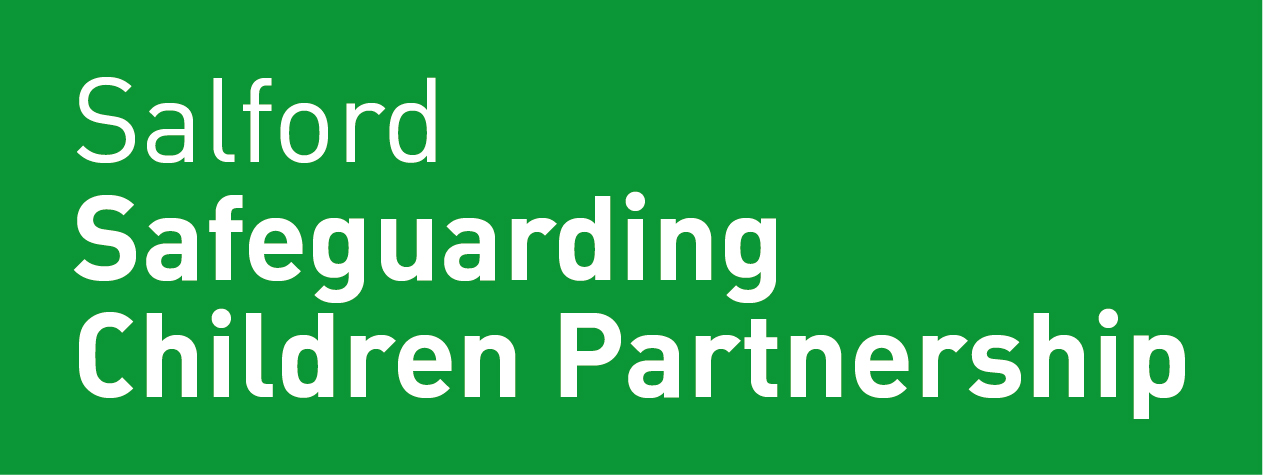September 2025
Strengthening Support for Families in Salford
Introducing the Families First Partnership Programme
Salford is proud to be part of the national Families First Partnership Programme—a transformative initiative improving how we support children, young people, and families.
Locally, this work is led by the Salford Safeguarding Children Partnership, bringing together professionals from early help, safeguarding, police, education, health, and community services. Together, we’re building a more integrated and responsive system of support—so no family is left behind.
More information and links to guidance is available in the Strengthening Support for Families in Salford document.
📧 To get involved, contact Clare Hopton: clare.hopton@salford.gov.uk
ICON Week 2025: Helping Parents Stay Calm When Babies Cry
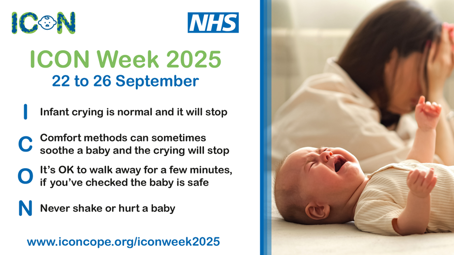
This September, organisations across the country will come together to support parents and carers during ICON Week 2025 (22–26 September).
The national campaign shares the important message: “Babies cry, you can cope!”
Crying is a normal part of every baby’s development. For many parents, it can feel overwhelming – especially when combined with the pressures of everyday life. ICON Week helps families understand why babies cry, offers practical coping strategies, and highlights the importance of looking after your own mental health.
This year’s theme is about mental health and staying calm. And that applies to everyone – mums, dads, and carers. For men in particular, talking about stress and finding ways to calm down before handling a crying baby can be a big challenge. ICON encourages both men and women to reach out for support, talk to someone they trust, and take breaks when needed.
Coping tips that can help:
- Create a calm space – turn off screens, lower the lights, and reduce noise. This can help both you and your baby feel more settled.
- Plan ahead with the ICON Crying Plan. In the heat of the moment, being told to “calm down” isn’t always helpful. The Crying Plan helps you think in advance about what works for you – whether that’s stepping outside for a breath of fresh air, calling a friend, or listening to music. Having a plan makes it easier to cope when the crying feels too much.
Dr Suzanne Smith, nurse, health visitor and founder of ICON, said: “Crying can push any parent to the edge, and it affects men just as much as women. ICON Week is about reassuring families that crying is normal, encouraging parents to care for their own mental health, and showing that support is always available. Taking steps to stay calm – whether that’s using the Crying Plan, reducing stimulation, or reaching out for help –
can make all the difference.”

Learning Event - Child Yvonne
To strengthen our Salford whole family approach to Think Child Think Adult Think Family , the upcoming learning event on Child Yvonne is aimed at staff from all agencies who work with adults, children, young people, families and the wider community.
Please forward on to your relevant contacts to help maximise the reach across agencies within both the children’s and adults’ workforce.
Date: Wednesday 5th November 2025. Time: 9am-1pm.
Places are limited. To apply, please complete the Application Form - Learning Event Child Yvonne
Keeping Your Child Safe in Sport Week 6-12 October
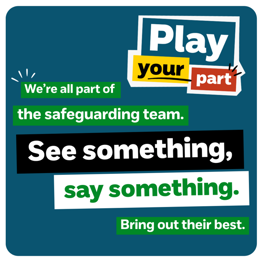
This year’s NSPCC Keeping Your Child Safe in Sport Campaign runs from 6-12 October 2025. We’re asking sports parents to play their part and talk to their children about how they can bring out their best through positive actions and support.
“As both Welfare Officer and a parent of young athletes, I know how important it is for children to feel safe and supported. When parents encourage open conversations and celebrate effort as much as results, it helps young people to thrive and enjoy their sport.” — Amanda, Club Welfare Officer at Agecroft Rowing Club, Salford
Download theNSPCC’s resources for parents, volunteers and professionals.
Access local support, guidance and training from Greater Manchester Moving’s specialist Sport & Physical Activity Welfare Leads. #SafeInSport
Sports Welfare and Safeguarding
GM Moving are committed to supporting safe, inclusive, and responsible sports environments. Free training and workshops sessions designed for coaches, volunteers, staff, and parents involved in youth and adult sport are available.
Every year October is ADHD Awareness Month across the World in many countries The mission of ADHD Awareness Month is to educate the public about ADHD by disseminating reliable information based on the evidence of science and peer-reviewed research .
The ADHD Awareness website states that their goal for this years ADHD awareness month is
To provide reliable information and resources to help people thrive with ADHD. In keeping with our 2025 theme, The Many Faces of ADHD, we encourage the ADHD community to increase awareness and understanding by sharing ADHD information and supports with all who could benefit.
Participating in ADHD Awareness Month can help spread knowledge and support for individuals with ADHD and their families. There are many ways you can get involved, here are some examples :
- Educate yourself - learn about ADHD its symptoms diagnosis and treatment options
- Share information - use social media and other platforms to share facts stories and resources using #ADHDAwarenessMonth
- Advocate for Education- Advocate for better understanding and accommodations for individuals with ADHD in schools and workplaces
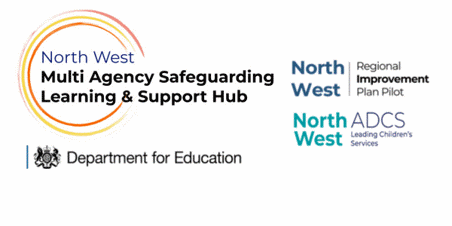
North West Safeguarding Partnership have developed a new website that aims to centralise tools, guidance and key updates.
Please sign up to the website: North West Safeguarding Partnership MoU | NWADCS

Fire Safety - Learning From Reviews
Greater Manchester Fire and rescue service work with partners and communities to prevent fires. But when a fire does happen, learning from it together is important to improve our partnership work in the community and prevent further incidents.
Following a recent incident, GMFRS worked with key partners including independent care providers to raise awareness of Home Fire Safety Assessments (HFSAs) and promote the referral pathway, ensuring that those at increased risk of fire receive appropriate support.
It is recommended that all partners engage and adopt the Seven Simple Steps approach to working together to reduce the risk of fire across Greater Manchester. In particular, it is recommended that agencies consider releasing frontline staff, particularly those involved in either assessing or delivering care in the home, to attend the training offered by GMFRS.
Published Case Review - 'Yvonne'
Local Child Safeguarding Practice Review (LCSPR), known as ‘Yvonne’, was published on Salford Safeguarding Children Partnership website on Monday 14th July 2025. This involves the death of an eight-year-old child and her mother. It is likely that there will be media interest in this case, and we are mindful that our workforce and community will be upset by seeing this information. Many practitioners from across Partner agencies were directly involved with the family. Please seek the support of your manager during this upsetting time.
Co-Production in Action: Parents and Professionals Collaborate to Shape the Future of the Thriving Families Tool
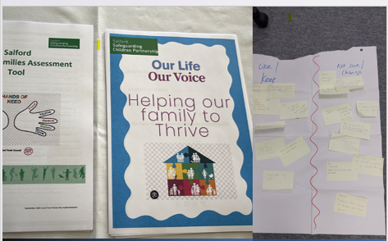
On Friday 27th June, the Salford Safeguarding Children’s Partnership hosted a vibrant co-production session with the Parents for Positive Change group and a range of professionals. The focus of the session was a collaborative review of the Thriving Families Tool, with the aim of shaping a refreshed version that is more engaging, accessible, and better captures the voices of children and young people.
The session was well attended, with representation from both parents and practitioners from key agencies. Attendees brought energy, insight, and a shared commitment to improving outcomes for families across Salford. Feedback on the initial draft of the tool was both positive and constructive, highlighting opportunities to simplify language, enhance visual appeal, and ensure the tool reflects the lived experiences of families, whilst capturing strengths and areas for development.
This collaborative approach is a key step in ensuring that the redesigned Thriving Families Tool is not only fit for purpose but also co-owned by the people who use it. The Partnership extends its thanks to all who participated and looks forward to sharing the next iteration of the tool in the coming months.
Don't forget to book on to the next Recognising and Responding to Neglect Conference on 25th September 2025 and find out more.
Space to Think: Reflective Practice Launch
Findings from reviews in Salford highlight the need for multi-agency professionals to have dedicated reflective spaces, particularly outside statutory processes. National reviews also emphasise the importance the importance of professionals needing the space and support to reflect on their practice to make better decisions for children and families
The SSCP in Salford has created the guidance on Space to Think: Reflective Practice aimed at shifting from a compliance-driven approach to one that values professional expertise, continuous learning, and multi-agency collaboration in a supportive environment.
If you not had chance to attend the two briefings we've already delivered, book a place on the next briefing on 17th September. There was also targeted session for Children's Social Care delivered on 1st July 2025.
The approach will be useful for any practitioner and manager who would benefit fro

m a multi-agency reflective space particularly:
- In situations where professionals feel ‘stuck’ or unclear about the systems, processes or decisions being made
- Where you are wanting a reflective space to think about what might be needed or helpful for a child, young person and their family.
- Wanting a safe and supportive space to think about what you and your colleagues may need help or support with, to improve practice including what might be needed or helpful for a child, young person, their family and the support network.
- Reflection and debrief following a significant event to enable a safe space to process the event with other multi-agency colleagues encouraging self-care of yourself and others to support future planning.
Working Together
Working Together to Safeguard Children 2023 has been updated with an illustrated guide, an animated video and details of a toolkit for children, young people and their families, and practitioners working with them.
The illustrated "Children and Young Person’s Guide to Working Together to Safeguard Children" explains how adults (such as teachers, social workers, doctors, and police) work together to keep children safe from harm. It describes what safeguarding means, who is responsible, and what happens if someone is worried about a child.
The guide highlights the importance of listening to children, making sure they are involved in decisions, and ensuring their views are taken seriously. It also explains what children can expect from professionals, including being treated with respect, being kept informed, and having their rights protected.
It covers:
- What safeguarding is and why it matters.
- How children should be listened to, respected, and involved in decisions affecting them.
- What happens when children or families need extra help (early help, safeguarding, and child protection).
- How schools, sports clubs, and community groups all play a role in noticing problems and offering support.
- Real-life examples (like Alfie’s and Zara’s stories) show how early help, and safeguarding can make a big difference.
The guide also explains children's rights, how information about them is shared, and what to expect during safeguarding processes like child protection conferences.
Why should schools share the illustrated guide with children and parents?
- Raises Awareness: It helps children understand what safeguarding means and that it’s normal and important for adults to work together to keep them safe.
- Empowers Children: Children learn they have rights — to be listened to, respected, protected, and involved in decisions about their care.
- Encourages Trust: It builds trust between children and adults by showing that safeguarding is about care, not punishment.
- Promotes Early Help-Seeking: If children recognise that support is available early, they are more likely to speak up if they feel unsafe or worried.
- Explains Processes Clearly: It demystifies what happens when concerns are raised, making safeguarding feel less scary and confusing.
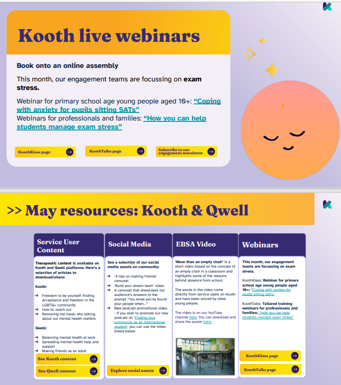
Mental Health and Counselling Service Update
Check out latest updates from Qwell.io, online mental health and counselling services.
Emotional Health Service Directory Update
The Salford Thrive Directory has been updated. The Directory has been developed to support anyone working or volunteering with children and young people. The directory will help you access useful information about different types of resources and services that are available to support children and young people's social, emotional health and well-being and to provide guidance when making a referral into services. For any queries about the directory please email EHWB@salford.gov.uk
Cared for Children
Take a look at the brilliant piece of work that GMYN have completed with our Salford care leavers: a comic called Hear My Voice. It has been featured in ITV news and the radio. Read and watch the article on the New comic book that reveals the lived experiences of Salford children in foster care | ITV News Granada
You can also view and order copies of 'Hear My Voice from GMYN
Don't forget to book on to the upcoming training session on 'Supporting Cared for Children and Care Leavers' in October 2025 available on the SSCP Training Programme | Salford Safeguarding Children Partnership
A 100% of delegates who attended the course reported feeling strongly confident or confident in their ability embed the learning into their practice
7 minute Briefings and Case Review updates
Reflect: on the learning also spotlighted in the CSPR Panel annual report and the NSPCC Recently published case reviews including the national case review collection- Updated case reviews added this month featuring issues including sibling sexual abuse, suicide, neglect identification & intersectionality. emotional abuse, child neglect, cultural competency, and children who have disabilities.
The SSCP produces 7 minute briefings to offer insights from case reviews and themed learning, along with challenge questions for agencies, teams, and individuals to reflect on and consider in their practice. The briefings can be used in a variety of ways:
- Individuals can use the briefing independently for their own learning and development and share with others.
- Teams/Managers encourage circulation and use for information and development and share learning amongst their team i.e. team meetings, supervision, peer support to reflect and improve practice and systems.
- Use at a structured event during training and/or briefing sessions to complement overall learning and development
New and updated 7 Minute Briefings include;
- Building Relationships
- Corporate Parenting Principles
- Escalation and Professional Challenge
- Equality Act
- Making a good referral
- Managing allegations against adults who work with children (LADO) - Updated guidance
- Parental Mental Health includes Think CHILD tool
- Positive Fatherhood
- Unknown Males
You will also find these new briefings and tools from the SSAB useful.
- Newly-published Briefing Document for SAR Harry (2025)
- Managing Allegations Against People in Position of Trust (PiPoT) in Salford 7-minute briefing and Short video (6 mins 10 secs) explaining the PiPoT process in Salford
- New Self-Neglect Guidance and toolkit
Developing Professional Curiosity
In partnership between the SSCP and the Salford Safeguarding Adults Board (SSAB) we have produced some joint webpages with information on professional curiosity which contains links to various resources including a short animation. Please take some time to look at these resources and share them with your teams / colleagues. They are still being developed so if you have any comments or suggestions, please let us know by emailing shahanara.begum@salford.gov.uk
Think Family

A number of reviews have highlighted the need for professionals to adopt a ‘Think Family’ approach to working with families. Please read the 7-Minute Briefing or plain text version including the Think Child - Think Adult - Think Family Guidance and please share and discuss it with your teams. Both documents can be found on the new joint Think Family webpages.
Cultural Consciousness
As Salford continues to become more ethnically and culturally diverse, we need to be aware of and proactive about equality, diversity and inclusion so that we can ensure that our city is a fair, respectful and supportive environment for everyone.
In response to reviews, Salford Safeguarding Children's Partnership has been developed Cultural Consciousness Guidance to support practitioners to be culturally aware and conscious in their practice. This contains information on intersectionality and the social graces framework. This guidance can also be used by practitioners working with children, young people, adults and their families.
Calls to Action: National/Local Updates and Learning

Child Friendly Salford
What one thing should be done to improve things for children and young people in Salford?
Becoming a ‘Child Friendly City’ is one of our seven corporate priorities. We’re working with partners to make Salford a great place for children and young people to grow up and feel safe, cared for, heard, and have quality opportunities to learn, work, and play.
We’re joining other cities across the UK, and across the world, in implementing a Child Friendly City initiative, which involves the whole city, from nurseries, schools, the college and university, to the police, NHS, sports clubs, and voluntary groups.
We’re at the beginning of our journey and are asking children and young people what they think a child-friendly city should be.
Can you help?
If you work with children and young people, or have got children, nephews, nieces, or grandchildren who live in Salford, please ask them what they think and let us know via the google online form.
We’ve been working with children and young people to design the identity for Child Friendly Salford that you can see at the top of this email. We want them involved every step of the way!
You can read more on our Child Friendly City webpage, and you’ll hear more about Child Friendly Salford as the programme progresses.
Right Care Right Person

Right Care, Right Person (RCRP) is a new approach to dealing with calls to the police from people with issues to which policing is not always the best agency to help. This could be where there are concerns for a person’s welfare linked to such issues as mental health, medical or social care needs where a police response isn’t always appropriate.
This new approach is about getting the right person with the right skills, training and experience to provide the best support for that individual.
Now with the new launch of RCRP, the police call handler will signpost callers to other more suited agencies where appropriate. Here in Greater Manchester, this could be Greater Manchester Mental Health, North West Ambulance Service or a service in their local authority. This approach will enable police officers to have more time to fight, prevent and reduce crime, harm, and anti-social behaviour; investigate and solve crime, and keep people and communities safe.
Get the right care from the right person
Self Care: Trauma Responsive Workforce
Whatever you have planned following the holiday period, try and make time to pause, reflect and take care of yourself.
Alongside support, supervision and services available to us in our organisations to support you and your colleagues, you should also prioritise taking better care of yourself and pay attention to what you need.
The following information and resources have been identified to support the wellbeing of our people and teams in the workplace including how we look after ourselves.

- Self care resources | Partners in Salford
- Stress - Every Mind Matters - NHS (www.nhs.uk)
- Managing stress and building resilience - tips - Mind
- Greater Manchester Resilience Hub - health and care staff wellbeing service
- Greater Manchester Wellbeing Toolkit | Greater Manchester Integrated Care Partnership
- Togetherall
- Six Degrees Social Enterprise – Supporting Your Mental Health (six-degrees.org.uk)
- Meditation and Sleep Made Simple - Headspace
- Trauma Responsive Greater Manchester (trgm.co.uk)
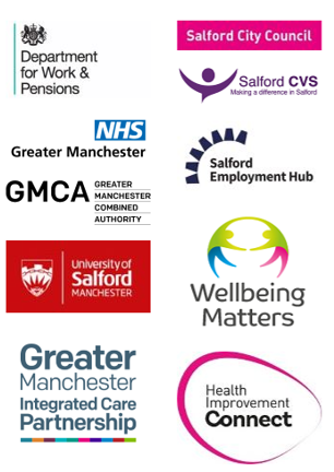
WorkWell in Salford
WorkWell is a free offer designed to support people with health conditions or disabilities whether a mental health or physical health concern such as a musculoskeletal (MSK) condition. The experienced WorkWell team will help you stay in work or return to work if you are employed, self-employed or recently unemployed and facing health related challenges to either remain in work or return to work. This includes:
- a personal assessment to understand the best support for your needs
- tailored plans to address your physical and mental wellbeing
- access to local health services, wellbeing activities, and community support
- careers advice and guidance to help you progress in your current job or explore new opportunities
- tailored support from a dedicated Work and Health Coach
For more information visit WorkWell (Health and Work Support)
Information and learning on a variety of subject matters related to safeguarding children and adults, can also be accessed through the SSCP Training Programme, 7 minute briefings, learning from Practice Reviews and the SSCP YouTube Channel.
All enquiries concerning the welfare or safety of a child or requests for information MUST BE SENT DIRECTLY to the Bridge Partnership.
The Bridge Partnership can be contacted on 0161 603 4500. All referrals and requests for support must be completed on the online referral form. The Bridge Partnership is available Monday to Friday 8.30am - 4.30pm. If you need to speak to someone outside these times, please contact the Emergency Duty Team (EDT) on 0161 794 8888. If a child is in immediate danger of being harmed or is home alone, call the police on 999.
If you are worried about an adult - Report abuse or neglect by telephone on: 0161 206 0604. For further information visit the Safeguarding adults page on the Salford City Council website.
Latest news
Details of all the latest news from the Salford Safeguarding Children Partnership.
